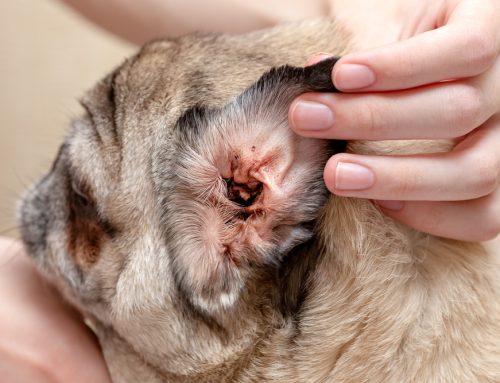You love your pet like family, and many of you share your bed and exchange the occasional messy kiss with your pet. Did you know, though, that your pet can transmit diseases to you? Our Countryside Veterinary Hospital team provides information about five ways your pet can make you sick, and how to protect yourself and your family from infection.
#1: Your pet can make you sick by spreading rabies
Rabies is a deadly viral disease that attacks the central nervous system. Relevant facts about rabies include:
- Transmission — Rabies typically is transmitted through the bite of an infected animal. In the United States, rabies is mostly found in wildlife such as bats, skunks, raccoons, foxes, and coyotes, but if your pet is infected, they can spread the disease to you through a bite or by licking an open wound.
- Signs — Signs in pets include aggression, excessive drooling, lack of coordination, paralysis, and seizures, while symptoms in humans include fever, headache, lethargy, confusion, and fear of water.
- Diagnosis — The only way to definitively diagnose rabies in pets is to test their brain after death.
- Treatment — No treatment exists for rabid pets. If a person is exposed to a potentially rabid animal, they can receive post-exposure prophylaxis (PEP) to prevent infection. However, if treatment is not provided and symptoms appear, rabies is always fatal.
- Prevention — Keep your pet’s rabies vaccination up to date to prevent this dangerous disease.
#2: Your pet can make you sick by spreading toxocariasis
Toxocara canis and Toxascaris leonina are roundworm species that live in a pet’s intestines and feed off their partially digested intestinal contents. Relevant facts about toxocariasis include:
- Transmission — Transmission occurs by contacting infected fecal material or contaminated objects. In addition, pets can be infected if they eat an infected intermediate host such as a rodent or bird.
- Signs — Toxocariasis is most problematic for puppies and kittens. Signs include diarrhea, vomiting, weight loss, dull hair coat, and a pot-bellied appearance. In people, children are at higher risk, and signs include fever, cough, enlarged lymph nodes, rash, and potentially liver disease.
- Diagnosis — Diagnosis is made by microscopically examining your pet’s feces.
- Treatment — If your pet has toxocariasis, your veterinarian will prescribe an appropriate deworming medication.
- Prevention — Deworm your pet monthly to prevent toxocariasis infection.
#3: Your pet can make you sick by spreading toxoplasmosis

Toxoplasmosis is caused by the single-celled parasite Toxoplasma gondii and is one of the most common parasitic diseases in the world, affecting nearly all warm-blooded animals, including pets and people. Relevant facts about toxoplasmosis include:
- Transmission — Cats are the definitive hosts for T. gondii. When they eat infected prey, the parasite is released from cysts in the digestive tract and produces oocytes. These oocytes are excreted in the cat’s feces by the millions, and they can infect other animals and people after being in the environment for one to five days.
- Signs — Most infected cats have no clinical signs, but if their immune system is compromised they can show signs such as fever, lethargy, and decreased appetite. Pregnant women and immunodeficient people are at highest risk for developing health problems after T. gondii exposure. The parasite can infect the unborn baby, causing health complications such as vision and hearing loss, brain damage, and in severe cases, death. Signs in immunodeficient people include enlarged lymph nodes, eye inflammation, heart disease, and central nervous system disorders.
- Diagnosis — Diagnosis is made through blood tests to measure antibodies against T. gondii.
- Treatment — Treatment typically involves antibiotics and anti-inflammatory medications.
- Prevention — To prevent toxoplasmosis, don’t allow your cat to eat rodents and birds, and wash your hands thoroughly after cleaning their litter box. In addition, pregnant women and immunocompromised individuals should not clean the litter box.
#4: Your pet can make you sick by spreading leptospirosis
Leptospirosis is a bacterial disease found worldwide in soil and water, and occurs most commonly in areas with warm climates and high annual rainfall. Relevant facts about leptospirosis include:
- Transmission — Pets typically are infected by drinking urine-contaminated water. Transmission also can occur if they are bitten by an infected animal or eat infected meat.
- Signs — Signs in pets include fever, muscle tenderness, lethargy, increased thirst and urination, vomiting, diarrhea, and jaundice. Symptoms in humans include fever, headache, muscle aches, vomiting, abdominal pain, and jaundice.
- Diagnosis — Diagnosis is made by detecting antibodies in the blood.
- Treatment — Treatment involves antibiotics, and supportive care may be necessary to prevent kidney or liver damage.
- Prevention — A leptospirosis vaccine is available for dogs who are at high risk. Other prevention methods include not allowing your pet to drink from natural water sources and avoiding contact with your pet’s urine.
#5: Your pet can make you sick by spreading cat scratch fever
Cat scratch fever is a bacterial disease caused by Bartonella henselae. Relevant facts about cat scratch fever include:
- Transmission — Transmission occurs through bites from infected fleas, ticks, flies, and lice. In addition, transmission can occur through an infected animal’s bite.
- Signs — Infected cats typically show no signs of disease. Signs in dogs include fever, heart arrhythmias, heart inflammation, swollen lymph nodes, and nosebleeds. In humans, symptoms include fever, headache, swollen lymph nodes, and lethargy.
- Diagnosis — Serology using immunofluorescence antibodies is the most sensitive tool for diagnosing cat scratch fever.
- Treatment — Treatment typically involves a long antibiotic course.
- Prevention — To prevent cat scratch fever, provide year-round flea and tick preventives to your pet, and wash all pet scratches and bites using soap and warm water.
The benefits your pet provides far outweigh your risk for catching an illness from them. If your pet is due for their rabies vaccine, contact our Countryside Veterinary Hospital team so we can ensure both of you are protected.








Leave A Comment